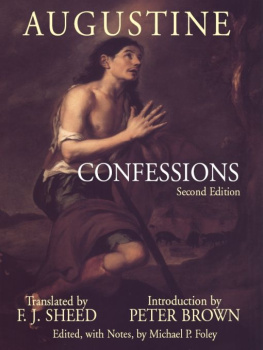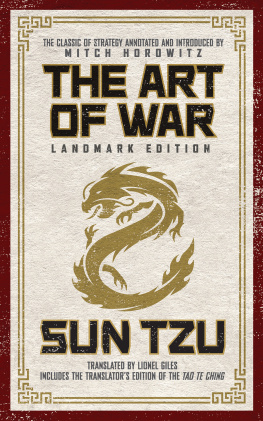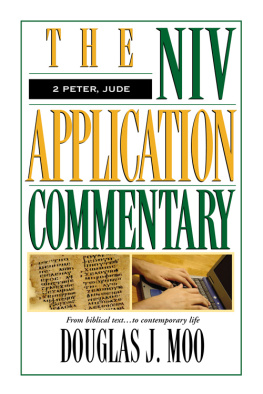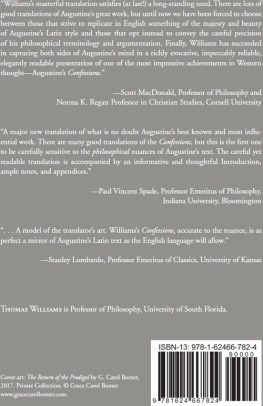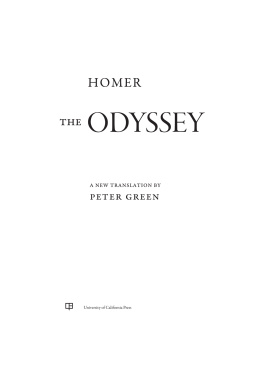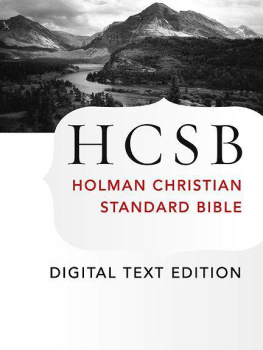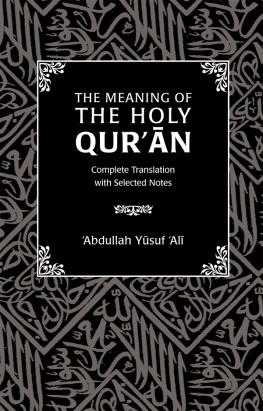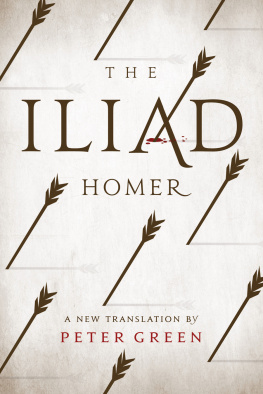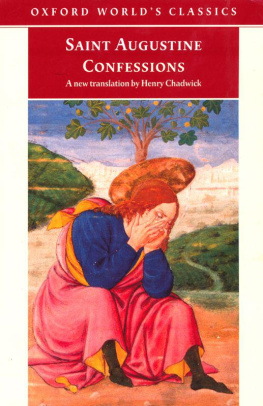Confessions
Augustine
Confessions
Second Edition
Translated by F. J. Sheed
Introduction by Edited, with Notes, by
Peter Brown Michael P. Foley
Hackett Publishing Company, Inc.
Indianapolis/Cambridge
Copyright 2006 by Hackett Publishing Company, Inc.
All rights reserved
13 12 11 10 09 2 3 4 5 6
Translation by F. J. Sheed from The Confessions of Saint Augustine copyright 1942 and 1943 by Sheed & Ward, Inc. Assigned to Hackett Publishing Company, Inc. 1992. First Hackett edition copyright 1993 by Hackett Publishing Company, Inc. Second Hackett edition copyright 2006 by Hackett Publishing Company, Inc. All rights reserved.
For further information, please address:
Hackett Publishing Company, Inc.
P.O. Box 44937
Indianapolis, IN 46244-0937
www.hackettpublishing.com
Cover design by Seth Dickson and Brian Rak
Composition by Bill Hartman
Printed at Friesens Corporation
Library of Congress Cataloging-in-Publication Data
Augustine, Saint, Bishop of Hippo.
[Confessiones. English]
Confessions / Augustine ; translated by F.J. Sheed ; introduction by Peter Brown. 2nd ed. / edited, with notes, by Michael P. Foley.
p. cm.
Includes bibliographical references and index.
ISBN-13: 978-0-87220-817-9 (cloth)
ISBN-10: 0-87220-817-6 (cloth)
ISBN-13: 978-0-87220-816-2 (pbk.)
ISBN-10: 0-87220-816-8 (pbk.)
1. Augustine, Saint, Bishop of Hippo. 2. Christian saintsAlgeriaHippo (Extinct city)Biography. I. Sheed, F. J. (Francis Joseph), 18971981. II. Foley, Michael P., 1970 III. Title.
BR65.A6E5 2006
270.2092dc22
[B] 2006016373
ePub ISBN: 978-1-60384-572-4
CONTENTS
Confessions
WHEN FRANK J. SHEEDS translation of the Confessions first appeared in 1942, it was met with a receptive and grateful audience. Augustines masterpiece had already been rendered into English by Edward Pusey and J. G. Pilkington in the previous century, and there had already been a steady if polemical tradition of English translations since the 1500s. But in the years that separated Sheeds work from the genteel Oxford Movement of Pusey and Pilkington, a devastating World War, the increasingly mechanized rhythm of modernity, and the curt iconoclasm of a new generation of writers had changed the language of street and parlor as much as it did the fabric of society. What to an earlier audience was expressive and mellifluous was now being construed as archaic and incomprehensible. Sheeds smooth and pristine prose came at the right time, and was variously hailed for being modern,contemporary, and intelligibleall without sacrificing dignity of expression or accuracy.
Sixty years later, even in the company of the half dozen or so translations that have since come out, Sheeds rendering has lost none of its eloquence or timeliness. F. J. Sheed (18971982) had a gift for language, one that was shaped in the classroom, tested on the soapbox, and exercised in the lecture hall. Born and raised in Australia, Sheed studied law at Sydney University before emigrating to England, where he became involved in the Catholic Evidence Gild, a commitment that put him in Londons Hyde Park every Sunday morning defending his religious beliefs from the stump. And when he was not parrying with hecklers in Britains rawest marketplace of ideas, Sheed was running the remarkable publishing house he founded (Sheed & Ward), writing books on theology (for which he was awarded a doctorate in sacred theology from the Holy See), andafter he moved to the United Stateslecturing to vast audiences as part of what we now regard as the mid-twentieth centurys Catholic Revival. Sheed even managed to continue these activities during the Second World War, traveling repeatedly across an Atlantic made perilous by German U-boats.
It was in the midst of this frenetic life that Sheed undertook one of his greatest labors of love, the translation of the Confessions . Sheed adored poetry and Latin more than anything (he took a Latin copy of Horaces Odes with him wherever he went), and so his translation of the rhetorically exceptional theologian had to be just right. His son Wilfridwho would himself go on to become an accomplished authorremembers how his father would translate one page at a time on the New York subway en route to the offices of Sheed & Ward. After he arrived, he would dictate his work to the future Pulitzer Prize-winning novelist Jean Stafford, checking and double-checking the cadence and sound. Since Augustine intended his confessions be read aloud, this attention to euphony gave Sheeds translation a unique strength (see p. xvii). To this day it remains the most canorous and resonant on the market.
Perhaps it is Sheeds unusual background that made him such a felicitous translator of St. Augustine. Like Augustine, Sheed had a rounder of a father and a Monica of a mother; like Augustine, he was schooled in the manipulation of words and arguments (if one wishes to give the practice of law a rather cynical definition); like Augustine, he had taught at a prestigious grammar school and was blessed with an incredible memory; like Augustine, he was a convert to Catholicism; and like Augustine, he spent the rest of his life dedicating his tongue to the greater glory of God and His Church.
But the more relevant affinity again draws us back to the crucible of language. As the Australia of Sheeds youth began to feel its British identity slip away, it responded with both originality and conservation: originality in its fostering of the spirit of national independence, conservation in its efforts to preserve all good things from its colonial founding. Subsequently, it was not uncommon to find Australians acting more English than their distant and now titular monarch. The fruit of this phenomenon was, among other things, a care for linguistic purism that surpassed even that of the mother country. Sheed, the drifter from the outback, was probably more exacting in his grammar and usage than most Chelsea headmasters.
Interestingly, something similar can be said of the linguistic formation of Augustine, who was likewise reared in an imperial outskirt that looked across the sea for its bearings, an outskirt not wanting, Augustine winces to tell us in the Confessions , in punctilious grammarians and rhetoricians. Hence, Augustine remarks elsewhere that when he was in Italy the locals grimaced at his North African accent, while he poked fun at their bad grammar. Both Sheed and Augustine, it seems, were outsiders to the ring that unified their world, and their only ticket in was impeccable speech. Yet from this pressure emerged a gracefulness with words, a loving facility with language, and a rare ability to fuse or transcend different cultural clusters of sign and meaning. In Augustines case, the combination of writing from the end of the Latin corridor with his own ability to preserve apostolic tradition in a bold and even novel way helped to make the Confessions ground-breaking not only philosophically and theologically but linguistically as well, pushing the conventions of classical Latin to their breaking point to effect a new synthesis of Ciceronian, biblical, and Late Latin (see pp. xviixviii).
One of the elements of Sheeds own linguistic style that requires some explanation today is his use of the word thou . In contrast to the rococo translations of the nineteenth century, Sheed employed the antiquated pronoun sparingly, using it only when it was clear that Augustine was addressing God in straight prayer. As Sheed mentions in the original translators note, he struck this compromise on the grounds that Christians of the English tongue are so accustomed to using Thou in their prayers, that You would sound odd.
Needless to say, however, most Christians of the English tongue now find Thou rather than You as the odd choice. Not only have the private habits of prayer changed, but even biblical translations and church services have for the most part adapted to modern usage. Further complicating this convention is that Augustine himself, as Sheed concedes, knew nothing of Thou as a term reserved for religious use: Latin authors used tu when addressing a single person, be it maid, master, or Maker, and vos when addressing two or more individuals. Why, then, in the twenty-first century, should thou be retained as a valid component in a translation of the Confessions ?
Next page
